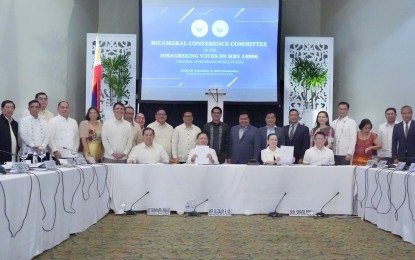MANILA – Lawmakers from the Senate and the House of Representatives composing the Congressional bicameral conference approved on December 11 the final version of House Bill No. 10800 or the proposed P6.352 trillion 2025 national budget.
On the same day, the two chambers of Congress ratified the bicameral conference decision, thus the budget, known as the General Appropriations Act, will be sent to President Ferdinand Marcos Jr. for his signature before Christmas.
While the Senate unanimously voted for the ratification of the measure, Senate Minority Leader Aquilino Koko Pimentel and Senate Deputy Minority Leader Risa Hontiveros voted no.
“The vote of this representation is a ‘no’ vote and I will just submit the explanation of my ‘no’ vote in due time,” said Pimentel.
“I would just like to manifest that I join the Minority Leader in the minority’s vote of ‘no’ to this bill. I will submit my explanation of ‘no’ vote in writing with emphasis on the effective defunding of PhilHealth in the bill,” said Hontiveros.
The proposed 2025 national budget is 9.5% higher compared to this year’s P5.268 trillion.
The final version of the 2025 national budget has allotted P26 billion for Ayuda para sa Kapos and Kita Program (AKAP) — a cash aid program for minimum wage workers — with the senators getting their own allocation once confined only to House members.
Earlier, the bicameral conference retained the P733 million budget for the Office of the Vice President despite last-minute bid of some senators to increase the outlay.
The House of Representatives’ budget panel opted to cut the OVP’s budget from P2 billion down to P733 million, citing redundancies in several projects with other government agencies.
Senators and members of the House of Representatives agreed to continue allocations for the Ayuda para sa Kapos and Kita Program (AKAP), but was reduced to P26 billion from P39 billion.
Presidential Legislative Liaison Office Secretary Mark Leandro Mendoza earlier said Marcos would sign the budget bill before Christmas Day.
Senate President Francis Escudero acknowledged the rigorous process undertaken by the bicameral committee to harmonize the differing versions of the proposed budget from the two chambers.
“This is the most important legislation passed annually by Congress,” Escudero emphasized, underscoring the crucial role of the budget in shaping the nation’s priorities.
He noted the challenges faced in allocating resources, highlighting the principle of balancing additions and cuts.
“We cannot increase allocations without making reductions elsewhere. This is why the work on any budget proposal is so demanding,” Escudero said.
Escudero also defended the alignment of the budget with President Ferdinand R. Marcos Jr.’s plans, clarifying that it was not a matter of blind adherence but a recognition of the overwhelming electoral mandate given to him by over 31 million Filipinos.
“It is only right for Congress to support the President’s vision and promises to the Filipino people,” he said.
Senator Grace Poe, chairperson of the Senate Finance panel, said the approved budget reflects a significant increase in funding for key sectors such as social protection, education, health, livelihood, and disaster response emphasizing that these increases demonstrate the government’s commitment to uplifting vulnerable sectors and investing in the nation’s future.
She assured that essential areas like defense, transportation, and infrastructure were also prioritized.
Poe also cited plans to strengthen national security, improve connectivity across regions, and build resilient infrastructure to protect communities from natural disasters.
“Bawat linya ng budget na ito ay resulta ng ating pakikipaglaban para sa inyo. Ang bawat pondo at programa ay idinisensyo upang tugunan ang inyong pangangailangan (Every line of this budget is the result of our fight for you. Each fund and program are designed to meet your needs),” Poe said.


















